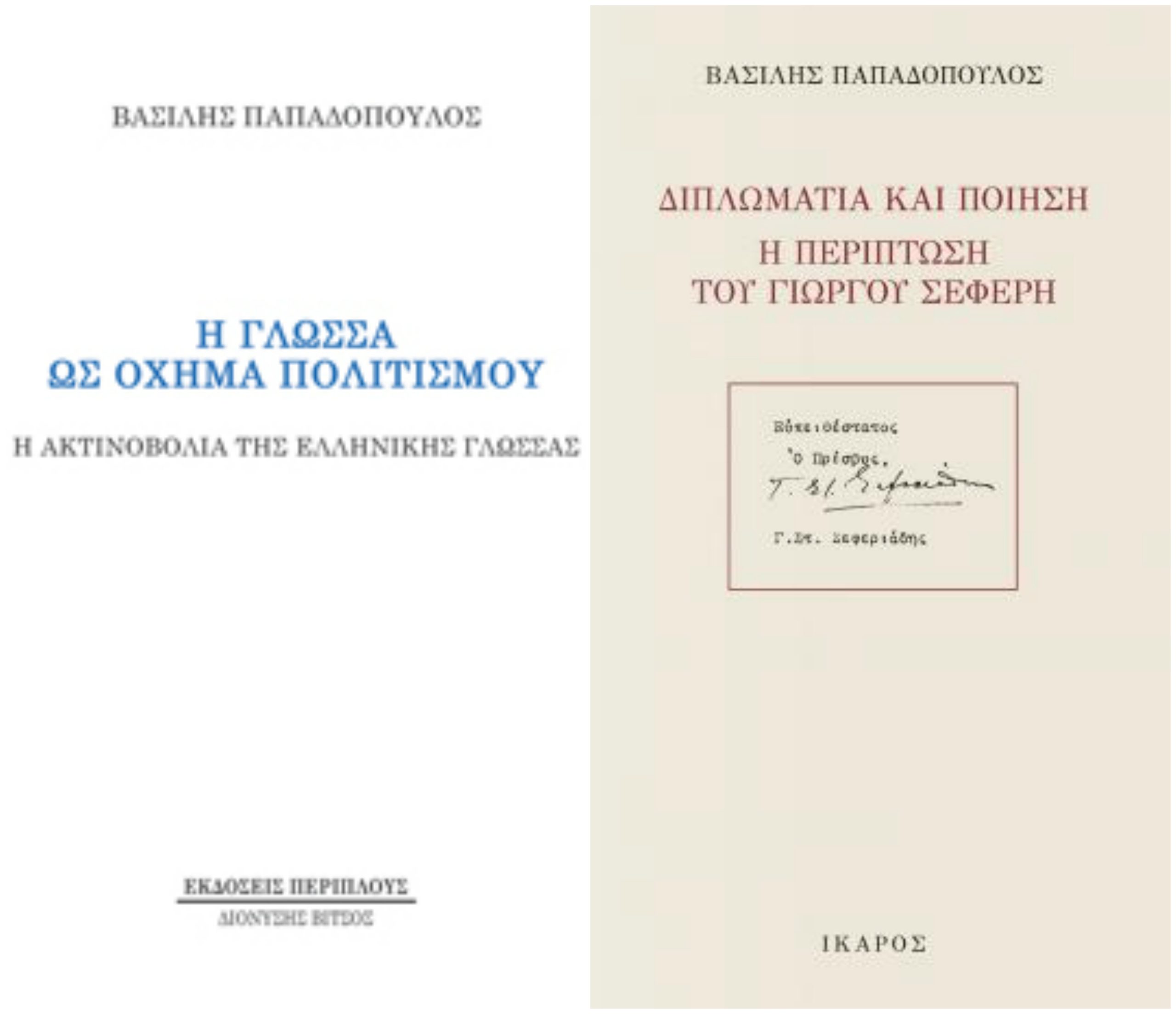Vassilis Papadopoulos is a career diplomat at the Greek Ministry of Foreign Affairs as well as a scholar specialized in international and cultural relations. He has graduated from the Law School of the National and Kapodistrian University of Athens, with post graduate studies in International and European Law in France. Since 1985 he has been a member of the Greek diplomatic corps, while most notably he served as ambassador in Kiev and Bucharest. His works of fiction have been inspired from the geographical settings while posted in the USA, Asia and Eastern Europe. Throughout his career, Vassilis Papadopoulos has specialized in EU and political issues as well as in cultural diplomacy. He gave lectures in several Universities and diplomatic academies. He wrote essays such as the role of language in international relations or the work of the famous Greek poet and diplomat George Seferis. Most recently, he published his essay “Language as a vehicle of civilization. The influence of the Greek Language.” Greek News Agenda* had the opportunity to interview him on the particular dynamics of the Greek language and its evolution throughout History.
In your book on the influence of the Greek language, you refer to its continuity. What are the most important landmarks in this continuity?
The unbroken continuity and history of the Greek language, highlighted by Greek historians and scholars, and most importantly, by Constantine Paparrigopoulos, could be marked by many milestones. They consist of both crucial decisions as well as of social phenomena. Decisions were political in nature, and this underlines the importance of politics today that many tend to underestimate, especially in literary fields. Thus the decision by Philip II, King of Macedonia, to establish Attic Greek as the official language of his court and of his kingdom is in my opinion a catalyst; and this is because it was precisely this language that, a few years later, Alexander the Great propagated throughout the vast empire he created. The decision of the Evangelists Mark, Luke, and John to write their Gospels in Greek rather than Aramaic was another major milestone. These texts are still being studied in the original today and they are written in our language, and in fact not in Attic Greek but in the spoken, “common” language of the era. The Gospel of Matthew may have been written in Aramaic, but it was also promptly translated and became well known in Greek. The decision by the Byzantine Emperor and great reformer Leo III “Isaurus” to issue legislation (the Ecloga, i.e., “Selection”) for the first time in Greek, signaling the definitive and complete Hellenization of the empire was of particular significance. Legal texts are usually the last bastion of a society’s linguistic tradition. A series of intellectual movements followed, including the 9th century Byzantine humanist movement that contributed to the preservation and study of ancient Greek literature by scholars, emperors, metropolitans and monks.
The culmination was the renaissance that started during the Paleologian era, which however did not last long due to the Ottoman conquest. Finally, the mass movement of Byzantine scholars to Italy after the fall of Constantinople carried over and thus saved Greek cultural heritage, especially in Venice, Rome, and Florence, and from there on throughout the West. The decision of the Patriarchal Council of 1593 proved to be crucial as regards the survival and continuity of the Greek language during the Ottoman occupation, and consequently for that of the Greek nation. It instructed all the Metropolises in Ottoman territories to establish schools and to even help the destitute to participate in education: “Each bishop should spend as much care and effort as possible in his parish so that the Divine and Holy scriptures can be taught, and aid those willing to teach and those willing to learn, if they are in need”. I’d say that the Greek Enlightenment movement is the next major landmark in the continuity of the Greek language. The work of prominent Greek teachers and scholars; the establishment of schools and universities; the work of Adamantios Korais; all contributed to the revival of our language and at the same time laid the foundations for Greek independence. We owe to the genius of Dionysios Solomos that our demotic language, the common language of the people, acquired an equal status with the traditional literary standard, for the first time ever. Drawing on Cretan literature, folk song tradition and Rigas Feraios, he literally provided structure and shape to the language spoken by the people and used it in unparallel ways to create aesthetic emotion through his poetry. His decision to write in colloquial Greek was exceptionally significant. Finally significant was the decision of the new Greek state to establish as its official language the simple katharevousa in 1834, which was reflected in the 1911 Constitution. In 1976, after many decades of intense controversy, political, literary and social, it was replaced by the demotic language.
Why have elites for many centuries and in many countries tended to adopt the Greek language?
This phenomenon is indeed impressive, and the first example that comes to mind is the Roman Empire. Following the conquest of the Greek cities, while Latin remained the official language of the state, the prominent Roman families that usually ruled Rome, as well as the intellectual elites of the empire, considered it almost compulsory to speak Greek. Similar reactions had earlier been observed in Asia, in the lands conquered by Alexander the Great, and later in the countries influenced by the Byzantine Empire, for instance Arab or Slavic, but also in the West, especially after the fall of Constantinople, even up to the twentieth century. The phenomenon is certainly not accidental. Studying Greek was a prerequisite for education and knowledge. It was the key to familiarization with ideas and achievements that were first formulated in the Greek language. The cultural accomplishments of Greek cities, especially from the fifth century BC onwards and up to the Hellenistic times, had an overwhelming appeal to scholars of the then known world. Knowledge of Greek allowed for Plato or Thucydides to be studied in the original, a deeper understanding of philosophy or medicine or even a deeper aesthetic appreciation of Sophocles’ tragedies or Homer’s epics. There were other civilizations that made a significant contribution to the global cultural edifice. The uniqueness of Greek civilization was unquestionably its anthropocentric orientation, which proved to be more universal and lasting, perhaps because it reflected human nature to a remarkable degree.
How close is the Greek language to its origins?
It is by now well established and widely accepted that the Greek language is one and indivisible. Throughout the centuries it has undergone the changes that every living organism experiences, but without any gaps, despite the incredible adventures and transformations of the Greek nation. To characteristically quote Elytis: I know only of one language, one single language, Greek, as it evolved from ancient Greek, which should be our great pride and support. […] For the Greek poet to still say today “sky” or “sea” or “sun” or “moon” or “wind”, as Sappho and Archiloch used to say, is no small matter. It is very important. We communicate every moment, talking to our roots. It is interesting to compare Greek texts that are 500 years apart, as for example, the works of Alexandros Papadiamandis with Georgios Phrantzes’ chronicle of the fall of Constantinople, or Saint Basil the Great with Constantine VII Porphyrogennetos, or the Gospel according to Mark with Xenophon. We find that the differences are not as great as those for instance between Moliere and Malraux, which are only 300 years apart, or those between Shakespeare and Eliot, that are 500 years apart. The continuity of Greek is impressive, despite the Greek language question that has tormented us since the Ptolemaic period, or perhaps precisely because of the centuries-long effort of Greek scholars to imitate and write in Attic Greek, which was the original paradigm for centuries.

You recently published a long essay on Seferis entitled “Diplomacy and Poetry”. Do you think Seferis goes back to earlier layers of the Greek language?
As a rule, no; I believe that the earlier layers of the Greek language are sensed in Seferis’ poetry through his subjects and style, for they almost never alter the striking linguistic clarity and homogeneity of his verse written with such simple materials. Seferis was deeply aware of all Greek intellectual tradition and believed that no art is created out of nothing, that the poet must be the natural continuation of all his forefathers. He often read Aeschylus in the original, as he did with Erotokritos. His poems reflect our entire long literary heritage, but always assimilated in such a manner that never alters the simple, unpretentious, Doric language in which he expresses himself. The image of Socrates’ apology in “Kichli” is very typical:
“And then the voice of the old man reached me; I felt it
falling into the heart of day,
quietly, as though motionless:
‘And if you condemn me to drink poison, I thank you.
Your law will be my law; how can I go
wandering from one foreign country to another, a rolling stone.
I prefer death.
Whose path is for the better only God knows.’”*
On the contrary, much more of the historical elements of our language are to be found in Elytis who, unlike Seferis, loves to create new words or to use older ones, as par excellence in “Axion Esti”:
“Remember:
the infighting Zephyr, the erebus-killing pomegranate
the flaming swift-footed kisses”
“Conqueror of Hades and savior of Eros”
“Hail Mother of Dreams and hail Pelagic
Hail Anchorbearer and Star-Quintessence”*
At a time when the use of English is dominant worldwide, what are the implications for Greek?
During my travels, I have noticed a Chinese person speaking English to a Moroccan or a Japanese speaking English to a Brazilian, and I am not surprised. I am merely astonished with the small vocabulary they use, and how worn out the English language becomes in this international course of globalization. As for us, I am occasionally surprised by trendy Greek expressions that appear suddenly out of nowhere. In most cases, they are just a translation of a corresponding English or, more likely, American expression. But the same is true in other languages I speak, such as French and Spanish. The diffusion of English through American mass culture is immense and the outcome is not positive. But we said that language is a living organism, it is constantly evolving, and I can’t see how this could stop. Nevertheless our heritage is profound. Our language, as we’ve noted, has articulated some of the most important advances in human thought. Moreover, our language is what kept the nation alive for centuries, and if we allow it to wear out, so will we. I believe that the only antidote is the serious and organized teaching of the Greek language in schools including original texts from every era. We could perhaps emulate countries with an excellent education system such as Finland and adapt it to the richness and history of our language. We could also adopt the American system in our Universities, where in the first year of every school basic literary and historical texts are taught. I have read many thoughts and suggestions on the subject, but I have not seen any results. Let’s hope.
Is there room for new interest to learn Greek?
From my experience as Ambassador to foreign countries, I quickly realized that the appeal of the Greek language as an ark of intellectual creation is receding at Universities and Colleges abroad, due to the undeniable need of students to make a living after graduation. The solution I would consider consists of two parts: The first would involve the organization of a better network of scholarships sponsored by private initiative. I am certain that students wishing to study Greek will use this opportunity and the bond forged through the Greek language will be enduring and unbreakable. There are already significant programs from major donors in place around the world. We could perhaps standardize this. The second part involves the prospect of employment through the knowledge of Greek. This obviously is more difficult to plan, as it depends on the dynamics of Greek enterprises, private or public, around the world and their demand for Greek-speaking personnel. These would also include the Hellenic Foundation for Culture, which is in dire need of support and modernization. Culture is, in my opinion, the most important product our country has been producing over time. It is a soft power that maintains its appeal and serves our country in any crisis, in any difficulty, sometimes without us being aware of it. It is our most solid ally, because even where enormous interests are at stake, the representatives of these interests are only people, with weaknesses and dreams, with personalities and beliefs. Many of them have been influenced by Greek culture and this plays an important role.
*Interview by Kostas Mavroidis. Translated from Greek to English by Magda Hatzopoulos.
“Kichli” excerpts taken from Edmund Keeley’s translation, “Axion Esti” excerpts taken from Jeffrey Carson and Nikos Sarris’ translation.
D.G.
TAGS: EDUCATION | FOREIGN AFFAIRS | GREEK LANGUAGE | HERITAGE | HISTORY | INTERNATIONAL RELATIONS | LITERATURE & BOOKS












